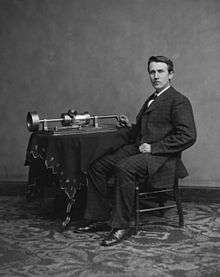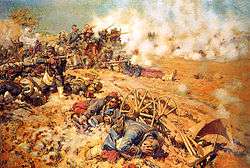1870s
The 1870s (pronounced "eighteen-seventies") was a decade of the Gregorian calendar that began on January 1, 1870, and ended on December 31, 1879.

From right to left, clockwise: Conflict erupts between the Second French Empire and the Kingdom of Prussia leading to the Franco-Prussian War in 1870; a fire in Chicago kills approximately 300 people and leaves about another 100,000 people homeless in 1871; Claude Monet's Impression, Sunrise is recognized as the source of inspiration for the Impressionist movement; The U.S. Army is defeated by Arapaho, Lakota and Northern Cheyenne tribes during the Battle of the Little Bighorn in 1876; Nicolaus Otto patents the first commercial four-stroke internal combustion engine; Queen Victoria is recognized as the “Empress of India” in the Royal Titles Act 1876; Emirate of Afghanistan forces defend against British Raj invaders in the Second Anglo-Afghan War; British Empire and Zulu Kingdom fighters engage in combat during the Anglo-Zulu War.
The trends of the previous decade continued into this one, as new empires, imperialism and militarism rose in Europe and Asia. The United States was recovering from the American Civil War. Germany unified in 1871 and began its Second Reich. Labor unions and strikes occurred worldwide in the later part of the decade, and continued until World War I. The Reconstruction era of the United States brought a legacy of bitterness and segregation that is still present.
| Millennium: | 2nd millennium |
| Centuries: | |
| Decades: | |
| Years: | |
| Categories: |
|
Politics and wars
Wars
- Franco-Prussian War (1870–1871) resulted in the collapse of the Second French Empire and in the formation of both the French Third Republic and the German Empire.
- The Third Anglo-Ashanti War, also known as the "First Ashanti Expedition", lasted from 1873 to 1874. The war ended with the destruction of the royal palace at Kumasi and the signing of the Treaty of Fomena which secured British trading rights in the area.
- The Third Carlist War (1872–1876) was the last Carlist War in Spain.
- The Ethiopian–Egyptian War was a resource conflict over access to the Nile Basin between the Ethiopian Empire and the Khedivate of Egypt from 1874 to 1876, resulting in an Ethiopian victory.
- Russo-Turkish War (1877–1878)
- In the United States, post-Civil War reconstruction continued until its conclusion under President Rutherford B. Hayes in 1877
- The Second Anglo-Afghan War was fought between the British Raj and the Emirate of Afghanistan from 1878 to 1880.
- The Anglo-Zulu War lasted from 11 January 1879 to 5 July 1879.
- The War of the Pacific was a war, lasting from 1879 to 1884, which was fought over resource-rich territory along the Pacific coast between Chile and an alliance of Bolivia and Peru.
Colonization, decolonization and independence
- The British Empire continued to grow; this decade marked the beginning of the New Imperialism.
- Bulgaria and Romania declared independence following a war against the Ottoman Empire.
- The Sioux battled the United States Cavalry and resisted encroachment by white settlers on the Great Plains.
- Passive resistance was used to prevent the confiscation of Māori land at Parihaka in New Zealand.
Prominent political events
- The German Empire and Alliance System emerged.
- Racial and economic politics in America's Reconstruction were bitter, pessimistic, and sometimes violent.
- The Gilded Age began in 1874, lasting until 1896.
- The First Spanish Republic rises and promptly ends (1873-1874).
- In 1876 the first Ottoman Constitution is promulgated, starting the First Constitutional Era (1876-1878).
Science and technology

Photograph of Edison with his phonograph, taken by Mathew Brady in 1877

The first version of the light bulb was invented by Thomas Edison in 1879
- The prototype telephone was invented by Alexander Graham Bell in 1876.
- The first version of the light bulb was invented by Thomas Edison in 1879.
- The phonograph is invented in 1877 by Thomas Edison.
- The steam drill is invented in 1879.
- The 6.35mm headphone jack was invented in 1878 and is still widely used today.
- Ludwig Boltzmann statistically defined thermodynamic entropy.
- 1873 Weltausstellung in Vienna, 1876 Centennial Exposition in Philadelphia and 1878 Exposition universelle in Paris.
Environment
- Atlas bear became extinct.
- Yellowstone National Park was established.
Popular culture
Literature and arts
- Jules Verne (France) publishes Around The World in Eighty Days
- Monet, Renoir, Pissarro, and Sisley organized the Société Anonyme Coopérative des Artistes Peintres, Sculpteurs, Graveurs ("Cooperative and Anonymous Association of Painters, Sculptors, and Engravers") for the purpose of exhibiting their artworks independently. Members of the association, which soon included Cézanne, Berthe Morisot, and Edgar Degas, were expected to forswear participation in the Salon. The organizers invited a number of other progressive artists to join them in their inaugural exhibition, including the slightly older Eugène Boudin, whose example had first persuaded Monet to take up plein air painting years before.[1] Another painter who greatly influenced Monet and his friends, Johan Jongkind, declined to participate, as did Manet. In total, thirty artists participated in their first exhibition, held in April 1874 at the studio of the photographer Nadar. The group soon became known as the Impressionists.[2]
- Jeanne Calment, born 1875, would eventually become the longest-living human being with a verified lifespan. She lived until 1997, at the age of 122. She still holds the record as of 2020.
- Lewis Carroll publishes Through the Looking-Glass.
- Henrik Ibsen releases A Doll's House in 1879
Fashion
People
Politics
- Eugène Borel, Director Universal Postal Union
- Gustave Moynier, President International Committee of the Red Cross
Famous and infamous people
- Sam Bass, Wild West, outlaw
- Charlie Bowdre, Wild West, outlaw/cowboy
- Richard M. Brewer, Wild West, gunslinger/cowboy, outlaw
- Crazy Horse, Native American war leader
- George Armstrong Custer, U. S. Army officer
- Wyatt Earp, Wild West, lawman
- E. B. Farnum, Elected official and one of the first residents of Deadwood, South Dakota
- "Wild Bill" Hickok, Legendary Wild West, lawman, gunfighter, and entertainer
- Doc Holliday, Legendary Wild West, gambler, gunfighter, outlaw, dentist
- Frank James, Wild West, outlaw
- Jesse James, Wild West, outlaw
- Calamity Jane, Frontierswoman and professional scout
- Jack McCall, murderer of "Wild Bill" Hickok
- Henry McCarty a.k.a. William Bonney a.k.a. Billy the Kid, Wild West, outlaw/cowboy
- Alexander McSween, Wild West, figure
- Lawrence Murphy, Wild West, racketeer
- Tom O'Folliard, Wild West, outlaw, best friend of Billy the Kid
- Giovanni Passannante, anarchist, attempted assassin of Umberto I of Italy
- Frank Stilwell, Wild West, outlaw/cowboy
- Al Swearengen, pimp and entertainment entrepreneur who ran the Gem Theater, for 22 years during the late 19th century
- John Tunstall, First man to be killed during the Lincoln County War
- John Younger, Wild West, outlaw
- Jim Younger, Wild West, outlaw
- Cole Younger, Wild West, outlaw
gollark: No. You can CLEARLY see that that is python.
gollark: Okay, hmm.
gollark: No, I can, my bot just imposes a timeout.
gollark: Ah. Yes. Forgot about that.
gollark: ++magic py ```pythonimport timewhile True: await ctx.send("<@198084875171921921>") time.sleep(1.2)```
See also
| Wikimedia Commons has media related to 1870s. |
Further reading
- Appleton's Annual Cyclopedia ... for 1870 (1871)
- American Annual Cyclopedia ... for 1872 (1873)
- Appleton's Annual Cyclopedia ... for 1873 (1879) online edition
- Appleton's Annual Cyclopedia ... for 1875 (1877)
- The American Annual Cyclopedia and Register of Important Events of the Year 1876
- Appleton's Annual Cyclopedia ... for 1877 (1878)
References
- Denvir (1990), p.32.
- Bernard Denvir, The Thames and Hudson Encyclopaedia of Impressionism (1990).
This article is issued from Wikipedia. The text is licensed under Creative Commons - Attribution - Sharealike. Additional terms may apply for the media files.
